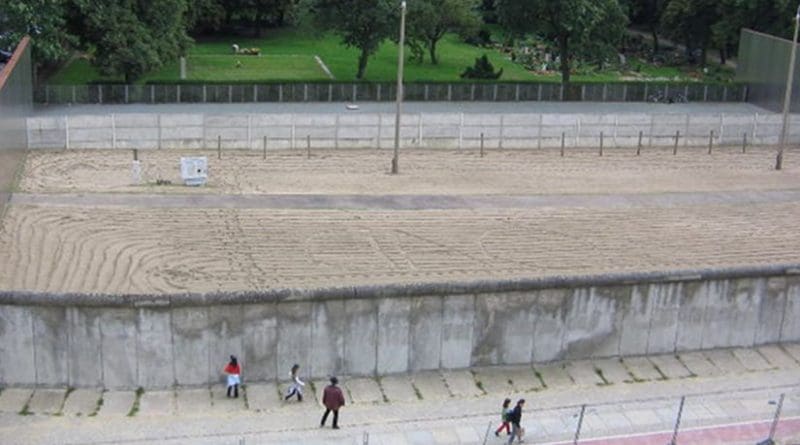2019: The Year of Anniversaries – OpEd
2019 marks several significant anniversaries. The 70th anniversaries of the founding of NATO and the PRC, plus the 30th anniversaries of the Berlin Wall’s collapse and the Tiananmen Square event are the most notable.
All have strategic implications. NATO’s establishment instigated the longest known period of peace in Europe for several centuries. The Berlin Wall’s collapse initiated the Warsaw Pact and the Soviet Union’s demise two-years later. The PRC’s founding eventually lifted millions out of poverty and gave rise to a global power. The Tiananmen Square event illustrated the Chinese Communist Party’s willingness to pursue brutality to maintain power, despite a strong undercurrent for change. What remains unknown is how the anniversaries’ participants will react at, and/or around the time of the remembrances’ dates. This is especially the case for those actors who suffered a defeat, were “humiliated”, or were the event’s “victims”. Each anniversary requires an assessment of the various scenarios that may unfold prior to and during their celebrations
NATO Anniversary – April 4th, 1949 and Fall of the Berlin Wall – November 9, 1989
Both events will be met with gratitude, controversy, and lamentation. NATO’s 70th Birthday will be praised by the Alliance’s newest members – most notably Poland and the Baltic States. The United States’ response will be a combination of celebration and criticism. The administration will probably voice support of the Alliance’s contribution towards maintaining security. It will likely chastise various NATO members for failing to financially contribute to the organization’s coffers as mandated by the Alliance’s Charter. A strong possibility is a repeat of the above events may occur during the Berlin Wall’s collapse remembrance, yet without Washington’s criticism.
Russia may attempt to spoil the NATO and Berlin Wall commemorations. A high possibility is Moscow will increase its military, cyber, and anti-Alliance public diplomacy activities in the prelude to the late April event. The Kremlin will probably expand its cyber-activities against the Baltic States and NATO starting in late March. Moscow may pursue additional military exercises in Kaliningrad, near Estonia, Latvia or with Belarus’s Polish and Lithuanian borders preceding celebrations around the Berlin Wall’s collapse. Russia’s pursuits can’t be discounted considering Vladimir Putin regrets the Soviet Union’s unfolding – an event linked to the Berlin’s Wall’s collapse. He may use those activities to remind the former Soviet satellites and NATO of Moscow’s continued strategic vitality.
Tiananmen Square Event – June 4, 1989 and the Founding of the PRC – October 1, 1949
The other two anniversaries to monitor surround the Tiananmen Square incident and the PRC’s Founding. Chinese authorities will probably squelch events surrounding the former, while augmenting/enhancing the later.
Many Party officials are wary of discussing the Tiananmen Square incident – and would prefer for it to vanish into the history books. Others, especially party reformers and the event’s student leaders, seek an open accounting of the incident. The Party’s cybercommunity and media sponsors will probably monitoring China’s internet server for the words “Tiananmen”, “Tiananmen Square”, “June 4th”, plus a combination of “6/4”, 4/6”, “89”, and “1989”. Any Chinese citizen identified using those will probably receive a sharp warning, be placed under surveillance, detained, questioned, or have their email blocked, be fined, imprisoned, or sent to a “re-education” camp similar to those in the Xinjiang province. The last group facing close scrutiny will be Party members and/or foreign media reporters. It will apply to those voicing opinions about or providing coverage of any event ceremonies. The CCP will attempt to prevent discussion, mention, or small talk about the incident in the prelude to the 30th anniversary. Any mention will probably be met with immediate reprisals as a message the topic is off-limits.
The Party will pursue the opposite approach towards the PRC’s founding. Party officials – and State media – will make a concerted effort to boast of China’s economic and diplomatic success in the prelude to the Party’s 70th anniversary. It will downplay, gloss over, and attempt to avoid debate of the country’s tragedies, most notably the Great Leap Forward and the Cultural Revolution. Chinese officials will also take a similar methodology towards Taiwan, Tibet, the Xinjiang province, plus the country’s political and legal rights records. Another question is whether the PRC will use the event as coverage for an augmentation/enhancement of its military activities in the SCS or ECS. It will depend upon the status of the PRC’s relations with the United States, Japan, its South China Sea neighbords, plus on the country’s domestic climate prior to the celebration’s events.
Several significant anniversaries will occur in 2019. The events will be remembered in Brussels, Berlin, and Beijing. What remains unknown is whether Moscow will attempt to spoil and/or taint the ceremonies surrounding NATO’s and the Berlin Wall’s celebrations. The CCP will probably seek to prevent any remembrances surrounding the Tiananmen Square incident. Chinese officials will highlight the country’s economic and diplomatic achievements owing to the Party’s founding. 2019 is a historically and strategically vital year whose importance cannot be underestimated owing to how those events the current international climate.
*Matthew Kennedy, MSc – Politics of China, School of Oriental and African Studies – University of London, Dillon, Colorado – USA

